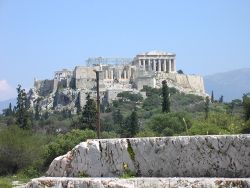Difference between revisions of "Template: Featured article 05 26" - New World Encyclopedia
From New World Encyclopedia
(Daily featured article 2009 36) |
|||
| Line 1: | Line 1: | ||
{{Main page article box| | {{Main page article box| | ||
type=Featured| | type=Featured| | ||
| − | title= | + | title=Acropolis| |
| − | image_name= | + | image_name=Acropolis3.JPG| |
| − | image_desc= | + | image_desc=The Acropolis of [[Athens]]| |
| − | text=The ''' | + | text=The '''Acropolis of Athens''' is the best known [[acropolis]] in the world. Although there are many other ''acropoleis'' in [[Greece]], the significance of the Acropolis of Athens is such that it is commonly known as "The Acropolis" without qualification. The site was inhabited as far back as 3000 B.C.E., and by the year 1400 B.C.E. had become part of a powerful [[Mycenaean]] city. |
| − | + | Under the [[city-state]] ruler [[Pericles]], a golden era in [[Athens]] began in the fifth century B.C.E. Athens was transformed into one of the most spectacular cities in the world. Taxes from all the other city states of [[Ancient Greece]] created a monumental home of the gods. The centerpiece was the magnificent [[Parthenon]], the temple of the virgin [[Athena]] who, according to Greek legend, won the city in a contest against the god [[Poseidon]], gave her name to Athens, and was subsequently revered by the people of ancient Greece. | |
| + | |||
| + | The Acropolis was designated as a [[UNESCO World Heritage]] site in 1987.}} | ||
Revision as of 14:58, 4 April 2017
Featured Article: Acropolis

The Acropolis of Athens
Under the city-state ruler Pericles, a golden era in Athens began in the fifth century B.C.E. Athens was transformed into one of the most spectacular cities in the world. Taxes from all the other city states of Ancient Greece created a monumental home of the gods. The centerpiece was the magnificent Parthenon, the temple of the virgin Athena who, according to Greek legend, won the city in a contest against the god Poseidon, gave her name to Athens, and was subsequently revered by the people of ancient Greece.
The Acropolis was designated as a UNESCO World Heritage site in 1987.